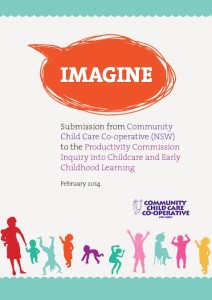Right now, the Productivity Commission is weighing up the future of the early childhood education and care (ECEC) sector, delivering recommendations for the sector in October this year.
Earlier this month education and care groups, advocates, services, parent and members of the public had their chance to have a say in the debate, tendering their submissions to the Productivity Commission.
In all, there were 424 formal submissions, with a further 701 comments made by members of the public. Some were simple one-page responses. Others were over 100 pages. Whatever the length, it became pretty clear after reading through the submissions there were clear agendas from those submitting responses.
For not-for-profit organisations, such as Community Child Care Co-operative (NSW), NSW Children’s Services Forum, Early Childhood Australia (ECA), Goodstart Early Learning, union groups and local and state governments, children were at the heart of the issue.
 Community Child Care (NSW) asked for the Commission to prioritise the child in its inquiry. “Early childhood education must be considered as the starting point of children’s education, not as a workforce issue. A child’s school education is not designed so that parents can go to work—it is designed for children and based on education and outcomes for children.”
Community Child Care (NSW) asked for the Commission to prioritise the child in its inquiry. “Early childhood education must be considered as the starting point of children’s education, not as a workforce issue. A child’s school education is not designed so that parents can go to work—it is designed for children and based on education and outcomes for children.”
“There is now an opportunity to put the best interests of children and their families at the centre of the system. This would mean that all future reform would be based on the primary question ‘is this in the best interests of children?’” wrote ECA.
Penrith City Council called for: “An integrated national ECEC system that puts children first: Children and children’s needs must be at the core of any country’s education system, including ECEC.”
Although stating they support quality service delivery, many for-profit services raised issues about costs to their services around regulatory burden (in light of the sector’s quality reforms), staff qualifications issues and staff shortages.
For many parents who responded, it was the issues of accessibility, flexibility and affordability driving their submissions, with the call for rebates for nannies front and centre.
Voice for change
Lisa Bryant, education and care consultant and advocate is hopeful the Inquiry leads to real change in the sector. “The Inquiry could be transformative for early education and care delivery in Australia. Some previous Productivity Inquiries have examined evidence and recommended new ways for Australia to tackle issues.”
Bryant, who was heavily involved in writing a number of submissions, says it will be up to the Government to decide how it acts on the recommendations, if indeed it does act. “Realistically, I expect we will see a merging of the benefits and rebates for families into one payment and a tinkering around the edges of the demand/supply issue, but few other changes.”
But she remains hopeful. “I hope we will see a number of positive recommendations in a number of small areas. I would love to see some capital funding commitment to enable the expansion of community-based services.”
She also hopes that measures to reduce costs don’t come at the expense of quality.
“My biggest concerns after reading the 420-plus submissions to the Inquiry is how many nutcases have a stake in this issue! Along with the predictable calls for measures that favour a range of interest groups, were calls that were truly out there—like importing child carers from Indonesia to work for a $1 per hour!
“Another big concern is that for so many of the stakeholders, childcare remains an issue purely to allow female participation in the workforce. Far too few of the submissions look at the benefits to children and to Australia’s productivity in engaging children in quality early education.”
On a positive, though, Bryant was impressed by the “considered” responses by many of the state governments, “who mostly truly get the importance of early education”.
It’s all about the money
One issue that was generally agreed on by the sector was the call for greater government spending on the sector. And while there were a range of measures suggested to take advantage of greater spending, the fact that the Productivity Commission has been instructed to make recommendations “within existing funding parameters” suggests increased spending is unlikely.
That said, though, a change to how the current funding is delivered is an option. Merging the two available family payments into one payment is a suggestion echoed by many stakeholders. Having government payments delivered directly to services rather than families was also suggested as a means to, hopefully, help drive down fees.
It’s clear from the submissions that something needs to be done. “Australia needs to redesign our system of supply of early education and care so it is affordable and accessible to all children, in line with the huge weight of evidence there is about the benefits of early education. But, alas, there are many, many stakeholders who would oppose such action,” says Bryant.
“Another early education and care activist clarified this for me perfectly when they said that the submissions of many engaged in the for-profit delivery of early education and care clearly explained why the market delivery of early education and care doesn’t work.”
What’s the point?
The Productivity Commission has been asked to report on:
- the contribution of childcare to workforce participation and child development
- current and future need for childcare in Australia, particularly given changes in work patterns, early learning needs, childcare affordability and government assistance
- the capacity of the childcare system to ensure a satisfactory transition to schools, in particular for vulnerable or at risk children
- alternative models of care, including those overseas, which could be considered for trial in Australia
- options—within existing funding parameters—for improving the accessibility, flexibility and affordability of childcare for families with diverse circumstances
- the impacts of regulatory changes, including the implementation of the National Quality Framework, on the childcare sector over the past decade.
The draft report from the Commission is due early July, with the final report sent to the Australian Government 31 October 2014.



No Comments Yet